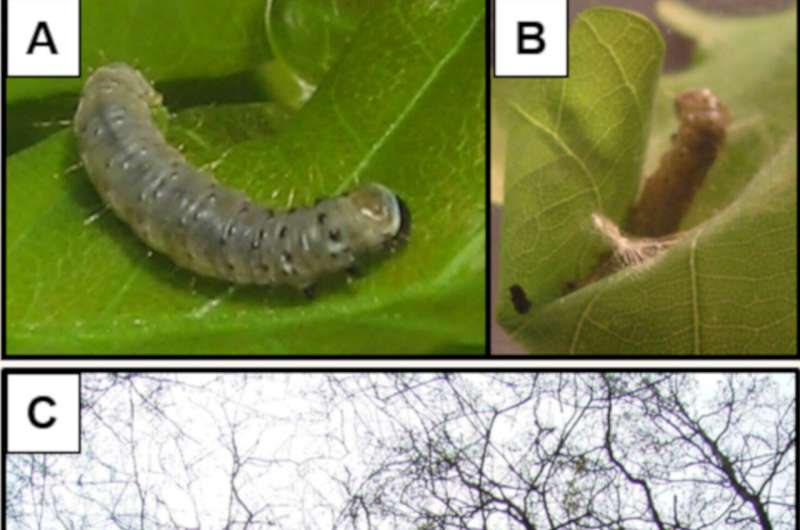This article has been reviewed according to Science X's editorial process and policies. Editors have highlighted the following attributes while ensuring the content's credibility:
fact-checked
peer-reviewed publication
trusted source
proofread
Bitter substances spoil the appetite of oak moth caterpillars

Trees have a huge arsenal of ways to keep the pests that attack them under control. In the course of evolution, for example, some English oaks (Quercus robur) have developed the ability to release volatile signaling substances when attacked by oak moths (green oak leaf roller, Tortrix viridana), whose caterpillars can completely defoliate the trees.
These chemical substances keep the female oak moths from finding the host tree and laying eggs. However, this is not the only defense strategy. Oak leaves contain a variety of secondary plant compounds, so-called phytochemicals, which are not essential to the tree but play an important role in plant-insect interactions. Some of these low-molecular compounds can literally spoil the appetite of oak moth caterpillars and impair their growth.
Researchers at the Thünen Institute of Forest Genetics in Großhansdorf and at Helmholtz Munich have now taken a closer look at the "total package" of these chemical substances formed in the metabolism of trees—the so-called metabolome. To do this, they compared oaks that are severely affected by oak moth caterpillars with those that tolerate infestation relatively well. Can differences in the leaf metabolome be found between the susceptible and the resistant trees?
"Resistant oaks invest more resources in the synthesis of bitter polyphenols. As so-called antifeedants, these make the leaves more difficult for the caterpillars to digest," says Dr. Hilke Schröder from the Thünen Institute of Forest Genetics. The researchers also took a closer look at the caterpillars' saliva and feces to find out what happens to the leaf components during and after digestion.
They found that plant secondary metabolites (e.g. flavonoids; a group belonging to the polyphenols) are retained longer and are not broken down as quickly as compounds from primary metabolism (e.g. carbohydrates). Furthermore, the metabolic reactions indicate different degradation pathways used by the larvae for the leaves of the resistant or susceptible oaks.
The microorganisms in the insects' gut (the so-called microbiome) were also of interest, as the gut flora plays a crucial role in digestion. The researchers fed oak moths over several generations with leaves that came either only from susceptible oaks or only from resistant oaks. Interestingly, the composition of the microorganisms in the gut remained relatively constant regardless of the type of leaves the caterpillars were feeding on.
This suggests that the gut flora is relatively stable and adapts little to the available food. Nevertheless, the oak moth caterpillars were able to minimize the unfavorable properties of the plant defense compounds—although with a lower growth rate and poorer fitness.
The study is published in the journal Functional Ecology.
More information: Marko Bertić et al, European oak metabolites shape digestion and fitness of the herbivore Tortrix viridana, Functional Ecology (2023). DOI: 10.1111/1365-2435.14299
Journal information: Functional Ecology
Provided by Helmholtz Association of German Research Centres


















